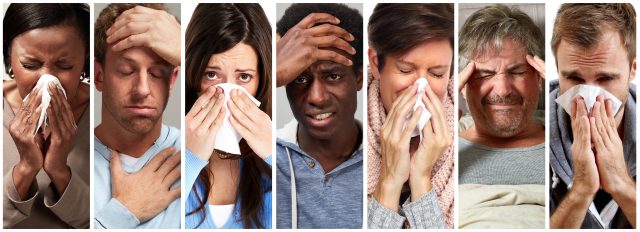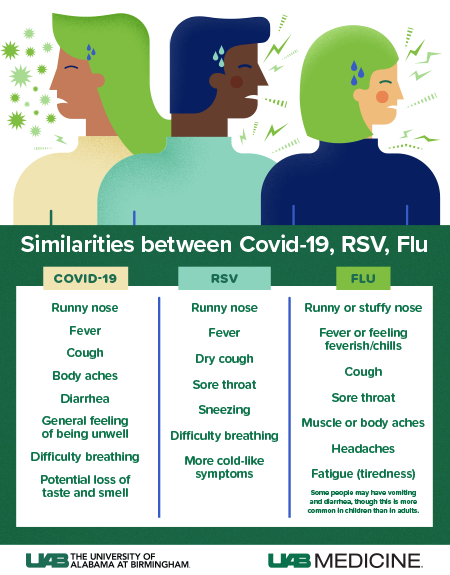
By Savannah Koplon
UAB News
This winter, influenza, COVID and RSV cases are surging across the United States. It seems as if everyone knows someone who has a runny nose, a fever or a cough, or who has had to call out of work for themselves or to take care of a sick child. Happy new year — ’tis the virus season.“While hospitalizations are steady for the time of year, they are rapidly increasing due to spread of severe illness,” said Rachael Lee, M.D., University of Alabama at Birmingham chief health care epidemiologist. “It is important to refrain from going to hospital emergency departments to avoid continued overstressing of the community’s resources.”
Mild cases of the flu, COVID and RSV usually do not require a hospital visit.
If you are experiencing symptoms like fever or feeling feverish or experiencing chills, cough, sore throat, runny or stuffy nose, muscle or body aches, headaches, and fatigue — call your primary health care provider or utilize UAB eMedicine to engage with a caregiver who can diagnose and assess your condition and needs without an emergency room or clinic visit.
Patients who choose to visit an emergency department or outpatient clinic should be aware of long wait times. All local hospitals are taking necessary steps to ensure patients receive appropriate care. This issue is occurring nationwide, not just in the Birmingham area.
Individuals with mild symptoms are encouraged to stay home from work, school or other gatherings.
Lee stresses that people who are knowingly sick should stay at home and avoid public places like stores, work or school, wear a mask around others, and take other precautions to not make others around them sick.
For those who are in high-risk populations, such as those who are immunosuppressed, prevention is key. This includes masking in crowded areas, avoiding public areas where they could get infected, and staying away from family and friends who are sick.
Regardless of whether someone is sick or not, practicing proactive and frequent hand hygiene is a critical way to stop the spread of germs and viruses.
What do I have?
RSV and flu seasons typically run from October to March, and while researchers are still trying to pinpoint COVID spike patterns, COVID cases have tended to present strongly during fall and winter months as well.
Since all three respiratory viruses have overlapping symptoms and intensities depending on a person’s response, it can be difficult to determine what virus one may have without panel testing.
Flu
Influenza, also known as the flu, is a contagious respiratory illness caused by flu viruses. It can cause mild to severe illness and, in some cases, lead to death, especially in people who are at high risk. The flu is different from a cold, as the flu usually comes on suddenly without warning.
People who have the flu often feel some or all of these symptoms:
- Fever or feeling feverish/chills
- Cough
- Sore throat
- Runny or stuffy nose
- Muscle or body aches
- Headaches
- Fatigue (tiredness)
- Some people may have vomiting and diarrhea, though this is more common in children than in adults.
RSV
Respiratory syncytial virus is a virus that causes infections of the lungs and respiratory tract. While cases of RSV in healthy adults can often present mildly and like the common cold, babies 12 months and under and older adults — including immunocompromised ones — can have a severe infection that can lead to hospitalization.
A long-awaited vaccine for RSV is now available for eligible groups, including children and older adults.
RSV can present some or all of these symptoms:
- Runny nose
- Dry cough
- Sore throat
- Sneezing
- Fever
- Wheezing
- More cold-like symptoms
COVID
In the nearly four years since the COVID virus emerged, different strains have presented varying cases of COVID that offer a wide range of reactions. Generally speaking — and based on what is being seen currently — COVID still is highly contagious and can cause severe reactions in those infected.
People with COVID may experience some or all of the following symptoms:
- Runny nose
- Fever
- Cough
- Body aches
- Diarrhea
- General feeling of being unwell
- Difficulty breathing
- Potential loss of taste and smell
Staying healthy this winter
For all three viruses, there are ways you can protect yourself, family and friends:
Get the flu and COVID vaccines if you are 6 months of age or older; get the RSV vaccine if you are eligible — it is not too late to get vaccinated to mitigate or prevent severe outcomes of illness.
There is no need to leave the house to get help with cold, flu or COVID symptoms. UAB eMedicine allows you to get the care you need, when you need it, from wherever you are. For on-demand urgent care, please visit uabemedicine.com.





